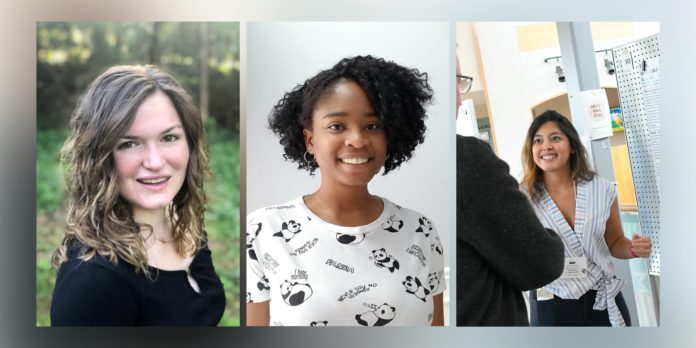MACON – Mercer University alumnae Liz Dreggors, Britney Hudson and Kyla Semmendinger were recently selected to the National Science Foundation (NSF) Graduate Research Fellowship Program (GRFP).
The program recruits high-potential, early-career scientists and engineers and supports their graduate research training in science, technology, engineering and mathematics (STEM) fields. Launched in 1952 shortly after Congress established NSF, GRFP represents the nation’s oldest continuous investment in the U.S. STEM workforce.
This year, NSF received approximately 13,000 applications, with 2,076 students receiving award offers.

Dreggors, from Dacula, earned her B.S. in biochemistry and molecular biology, with a minor in math, in 2018.
She performed undergraduate research with Dr. Amy Wiles, associate professor of biology in the College of Liberal Arts and Sciences, studying stress response in the yeast (S. cerevisiae) model system. Through this work, she developed an interest in big data analysis and the yeast model system, which she continues to pursue as a Ph.D. student in the Biochemistry, Cell and Developmental Biology program at Emory University.
At Emory, Dreggors uses yeast as a model organism to study the ribosome, the protein synthesizing translation machinery of the cell. Translation is dysregulated in many diseases, and the control of translation is important in a number of processes ranging from viral infection to oncogenesis. Her current research focuses on understanding the fundamental mechanisms of translation regulation that contribute to disease.
“My receipt of this fellowship is a testament to the incredible mentorship and training I received at Mercer and am receiving now as a graduate student at Emory,” said Dreggors. “I could not have received this award without the strong foundation my Mercer mentors helped me create, especially my academic adviser Dr. Garland Crawford and my research adviser Dr. Amy Wiles. My hope is to be able to pay that forward and help the next generation of students like they have helped me.”

Hudson, from Atlanta, earned her B.S.E. in biomedical engineering in 2015.
She performed undergraduate research with Dr. Sinjae Hyun, professor of biomedical engineering in the School of Engineering, investigating aerosol deposition in a lung airway model for drug delivery.
At Clemson University, Hudson is a Ph.D. student in the Department of Bioengineering, where she is researching how chemical and mechanical stimuli influence bladder dysfunction, particularly the role of hypoxia in inflammation and fibrosis in a diseased bladder in the lab of Dr. Jiro Nagatomi, professor of bioengineering.
“I’m grateful to receive this recognition and thankful for the support I received from my past and present mentors,” said Hudson.

Semmendinger, from Bremen, earned her B.S.E. in environmental engineering, with minors in engineering for development, chemistry and Spanish, in 2018.
She performed undergraduate research with Dr. Laura Lackey, dean and Georgia Kaolin Chair of Engineering, and Dr. Michael MacCarthy, assistant professor of environmental engineering in the School of Engineering, regarding low-cost water quality treatment in developing countries. For this work, she was awarded the prestigious Goldwater Scholarship in 2017.
At Cornell University, Semmendinger is a Ph.D. student in the Department of Biological and Environmental Engineering, where she focuses on field of water resources management with concentrations in eco-hydrology, risk analysis and management, and community natural resource management. Her graduate research to this point has been to investigate climate-smart flood risk planning for coastal communities on Lake Ontario. She is now beginning to research the advancement of subseasonal-to-seasonal forecasts and their potential to inform coastal decision-making and improve water level management on Lake Ontario. Semmendinger is also a Graduate Research Fellow though the Cooperative Institute for Great Lakes Research.
“My successes are a direct result of time that the people in my life have invested in me,” said Semmendinger. “From countless hours providing feedback on research activities, editing applications and academic papers, or providing a listening ear during the stressful moments that naturally accompany research, the incredible faculty and staff that I’ve interacted with and learned from throughout my studies cannot go unrecognized. Every award is just as much a testament to their abilities and skills as it is my own, and I am extremely thankful for the crucial role they have played in my education and career.”
The National Science Foundation is an independent federal agency that supports fundamental research and education across all fields of science and engineering. NSF funds reach all 50 states through grants to nearly 2,000 colleges, universities and other institutions. Each year, NSF receives more than 50,000 competitive proposals for funding and makes about 12,000 new funding awards.










